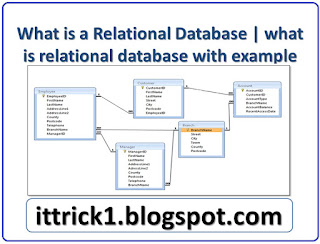What is a Relational Database | what is relational database with example
 |
| What is a Relational Database what is a relational database with example |
Introduction:
It was 1970 when E. F. Codd purposed a new term relational database. In a relational database, data is accessed in tables. It based on SQL
(Standard Query Language). It was 1970 when E. F. Codd in IBM introduced an
organizing relational database management system (RDBMS) in columns and rows. And
this organizing table consists of relation, attributes, row, tuple, foreign key, and primary key, etc.
This database is classified into other types. This article
will explain all the above information. This article focused on the relational Database
management system instead of Database management System.
RDBMS Rational Database Management System:
Just as a database management system, relational database have
own management system, We can define it as “Software, online server or the website used for the management of database is called relational database
management system”. It is shown in tabular form.
Structure of RDBMS:
According to the definition, it consists of columns and rows. For
example, you have an order-taking company you should be creating a relational Database. You will create four basic columns, Name of customer, Order of
customer, the number of products and Address or phone number. Then in rows, you
will put information.
Let’s discuss some terminologies:
- Database store in the table that is called “relation”.
- Columns are “Field”. Information stores in rows called “record”.
- The primary key is an identifier key which identify the record,
- Foreign key act as a bridge and create a link between to tables.
“Domain” is an area of information on the computer. It is used
for commercial purposes.
Some most important examples of rational database management systems are given below:
- MySQL
- Oracle
- Microsoft Access
- MS SQL server
- IBM DB2
These software and websites
provide us the opportunity to store rational database
Do you know there is a difference between DBMS and RDBMS?
DBMS and RDBMS are not the same terms but we consider these
terms are the same and mix both in exams.
So the difference between both DBMS
and RDBMS is given below:
DBMS
|
RDBMS
|
·
It store information in files.
|
·
It store information in tables.
|
Components of the relational database management system:
Each database
consists of several components in which it works accurately, easily, and we can
manage it. RDBMS also consists of three components:
- Data structure
- Data integrity
- Data Manipulation
Data Structure:
It is the first component
of the relational database, and we can define it as “Structure that is designed to
store and organize data is called Data Structure”. It includes:
- Table: It consists of rows and columns; it is the structure of the database.
- Record: it store information, these are rows of the table.
- File: it is used in data processing, and used to store all records.
- Array: It is used to store data; SSDs and HHDs are used to store and describe data.
- Algorithms: it deals with SQL, to solve problems.
Data Integrity:
It is the second
component of RDBMS; it deals with the accuracy and security of data. It
includes:
- Data Encryption
- Access Control
- Data Backup
- Data Validation
- Input Validation
Data Manipulating:
It is the third
component of data, it deals with programing, Or SQL language, it includes:
- Inserting-Information
- Deleting-Data
- Modifying Or Updating data etc.
Advantages of RDB:
- It stores data in the table.
- It gives Accuracy feature.
- It is flexible and can deal with Complex SQL.
Conclusion:
After seeing Structure of RDBMS, Some features of RDBMS,
Component of RDBMS and advantages of rational database we can say that it is
more easy, flexible and efficient than a simple database. Rational database
management system is used in many pharmaceutical and business relating
companies. The most important feature of this system is the tabular form, it is
easy to use and store accurate data.












No comments
Note: Only a member of this blog may post a comment.